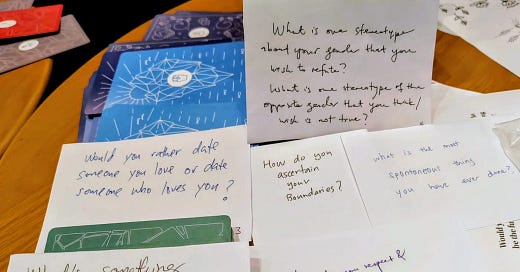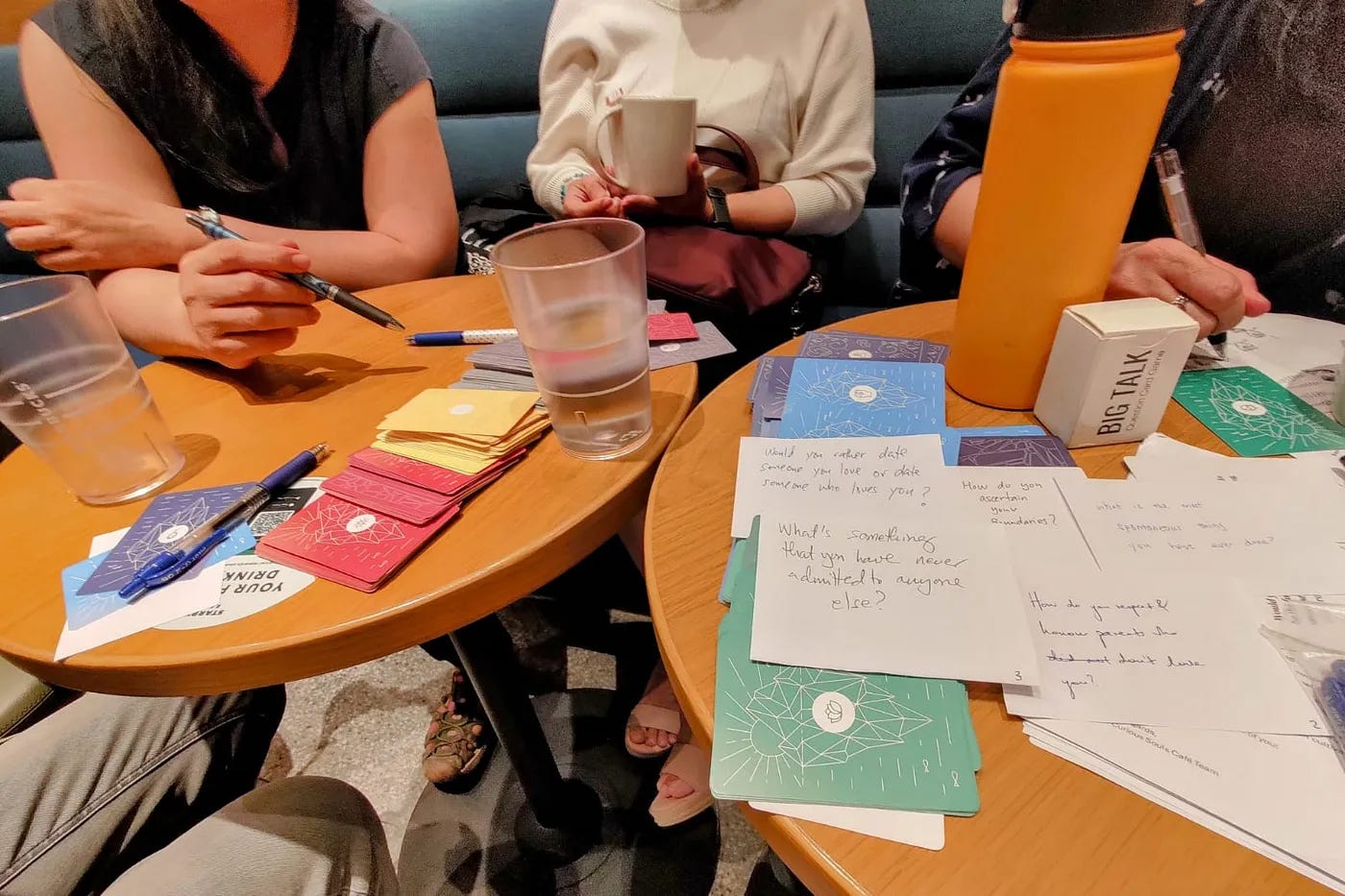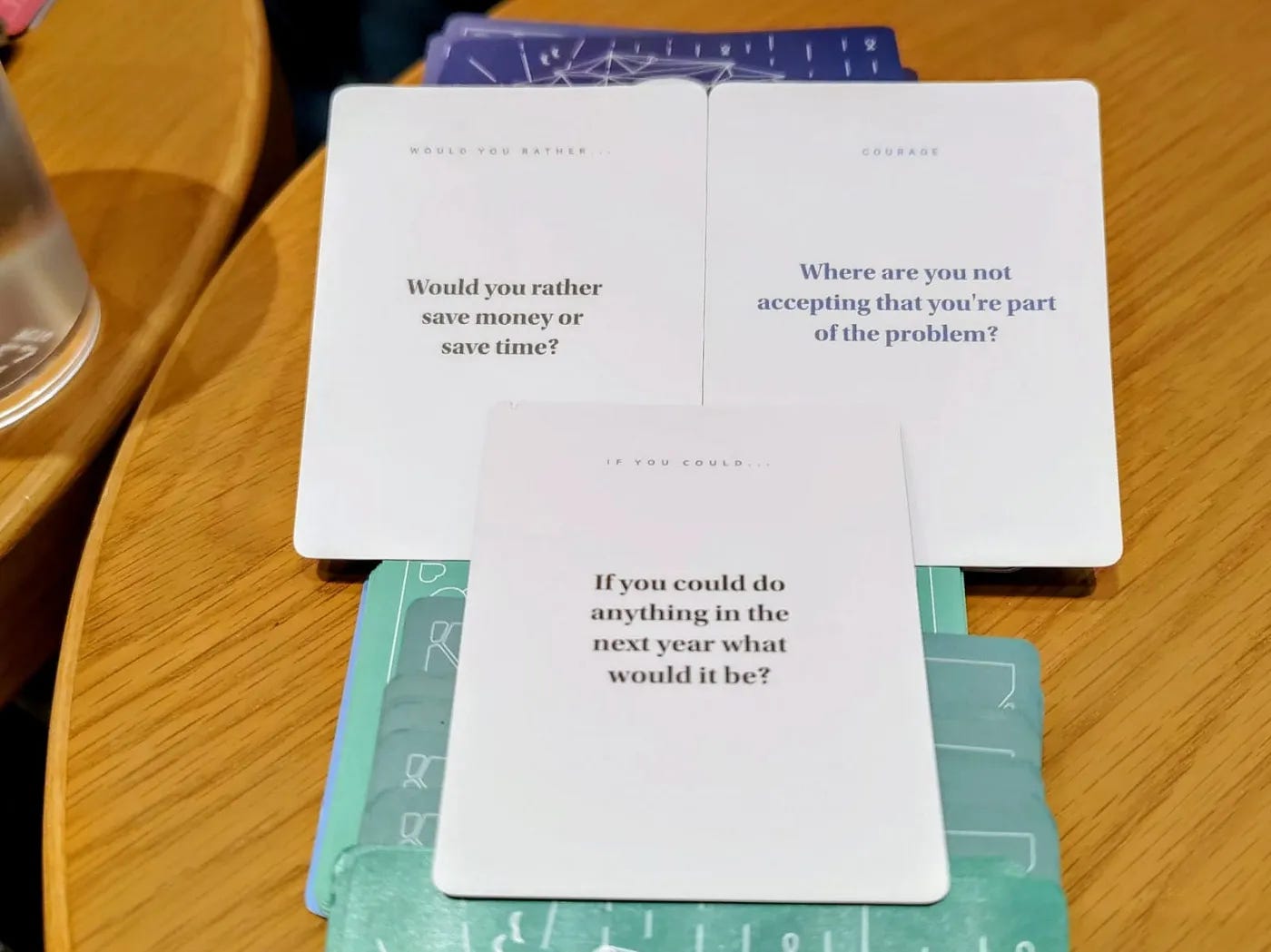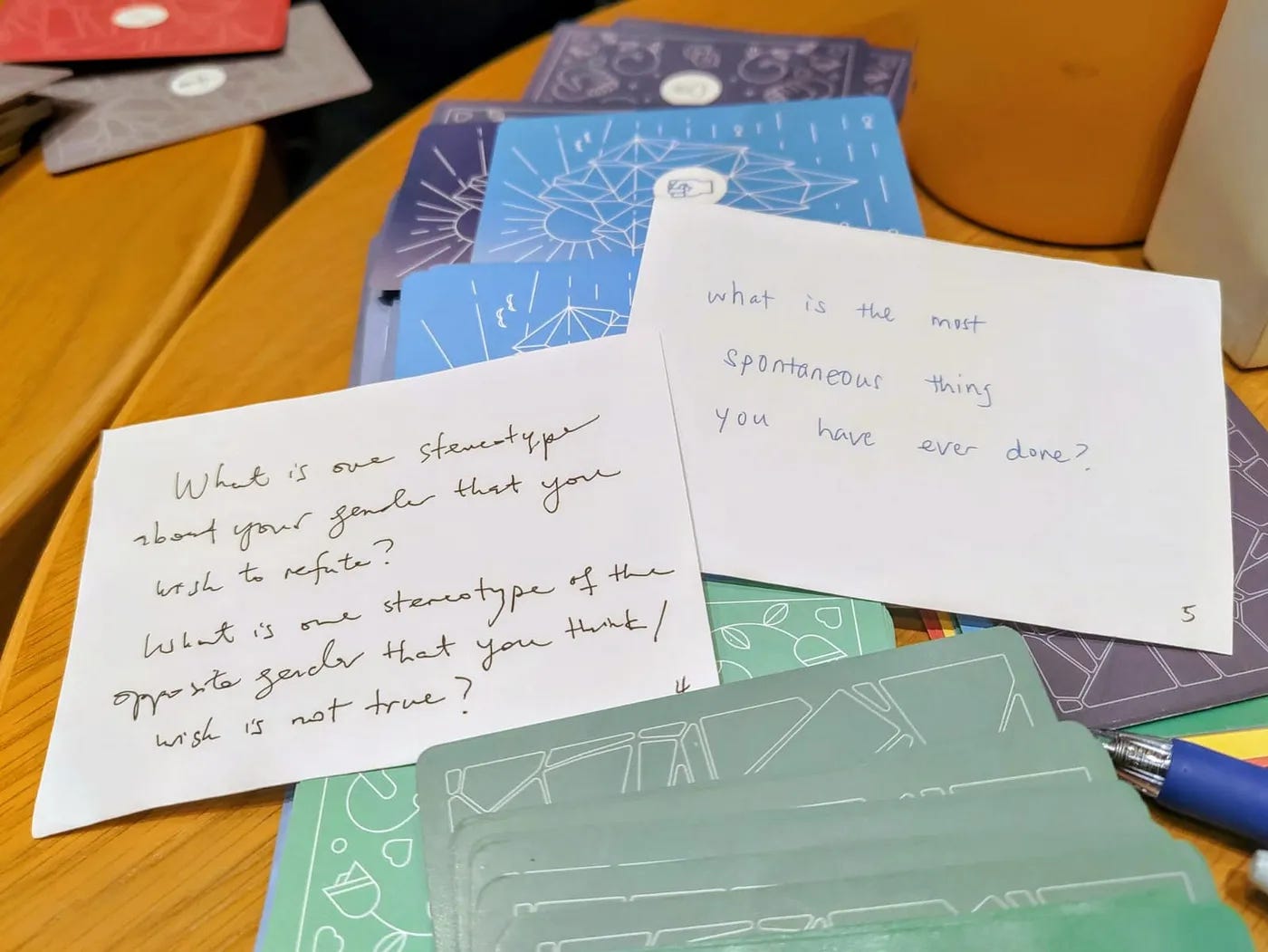Authenticity, Values, and Responsibility: Conversations at Curious Souls Café Singapore
The Curious Souls Café, a meetup for meaningful conversations, recently hosted its third session in Singapore on January 16, 2025. Through a carefully structured dialogue, participants delved into life’s complexities, sharing deeply personal reflections and exploring profound questions. Far from a casual chat, the event offered a unique opportunity for introspection, connection, and growth among a group of curious individuals.
The Three-Part Structure: A Framework for Exploration
The sessions at the Curious Souls Cafe are thoughtfully designed with a three-part structure that encourages participants to reflect, connect, and grow:
Icebreaker Questions (Curated Cards)
Open Discussion (Blank Paper Prompts)
Moment of Truth (Final Reflections)
This purposeful design fosters meaningful conversations that go beyond surface-level exchanges.
Icebreaker Questions: Curated for Connection
The session began with participants selecting questions from a deck of curated cards. These prompts, curated to avoid overly sensitive topics, aim to spark meaningful sharing and authentic connection. Here’s how the group responded to some of the key questions.
1. Exploring Self-Improvement
“What’s one thing you’d like to get better at over the next year?”
This question acted as a catalyst for participants to open up about their aspirations for growth. While the theme of self-improvement was shared, each response revealed unique personal pathways:
Authenticity: One participant expressed a desire to be more authentic, resolving to do what is true to themselves and to stand up for their own needs. This focus on personal integrity highlighted a desire for personal growth from her relatively more reticent past.
Mindfulness in Thought, Action, and Speech: On the contrary, another participant hoped to achieve the exact opposite because of her comparatively more outspoken past. The participant aimed to cultivate mindfulness, striving to live more deliberately and mitigate impulsive tendencies, better managing her emotional responses.
Navigating the World of Dating: A more personal response touched on the desire to transform passive approaches to dating into active efforts, embracing the vulnerability of taking initiative.
Insights:
The responses illustrated diverse pathways to personal growth. Depending on one’s starting point in life, one may choose to balance it with the opposite personality traits.
Themes of authenticity, self-awareness, and emotional regulation emerged as common threads, reflecting a shared commitment to becoming better versions of oneself.
2. Exploring Values and Priorities
“Would you rather save money or save time?”
This seemingly simple question sparked a nuanced discussion about values and priorities:
Most of our open-minded participants prefer time:
“Once time is gone, it’s gone.”
Time as an Irreplaceable Resource: One participant, inspired by a colleague’s worsening health condition, emphasized the finite nature of time. She viewed time as the ultimate resource to prioritize, underscoring the importance of spending time meaningfully with loved ones.
Context-Dependent Priorities: A participant highlighted how the choice depends on life circumstances, noting that financial struggles can make saving money a priority, whereas financial stability shifts focus toward time.
A Question of Spending: One participant reframed the question to focus on “spending” rather than “saving”, emphasizing the intentionality behind how we spend both time and money.
Insights:
The discussion revealed how personal experiences — like illness or financial hardship — shape our views on time and money.
Participants moved beyond the binary choice, exploring the deeper implications of how we spend these precious resources.
3. Exploring Personal Responsibility
“Where are you not accepting that you’re part of the problem?”
This challenging question prompted a profound exploration of personal accountability, touching on both interpersonal dynamics and systemic issues:
Lack of Flexibility: One participant admitted to being very opinionated before, recognizing the need to consider others’ perspectives.
Systemic Complicity: One participant acknowledged being “part of the problem” and reframed it as a positive act of challenging the status quo and amplifying voices on social issues. She recognized her complicity in these issues, including benefiting from exploitative systems, which underscores the complexity of systemic responsibility.
Individual Responsibility: Conversely, while also candidly admitting that he was part of the problem, one of our facilitators emphasized the importance of personal responsibility in addressing such challenges. He believes that even small individual actions can create a ripple effect, inspiring others to take initiative. Over time, this collective effort can lead to meaningful and lasting change.
Acceptance and Perspective: Another participant thoughtfully pivoted the conversation and stated people do not accept being part of a problem due to the human inability to accept differences in other people’s views and perspectives. Often, acceptance depends more on how a message is conveyed, rather than the underlying message. This perspective suggests a shift away from blame and towards the acceptance of human diversity.
Insights:
The responses illustrated how accountability spans from personal relationships to larger societal systems.
Participants’ views on what constitutes “the problem” and how to solve it vary. There are no right or wrong answers — they are like yin and yang, which constitute the whole, as a facilitator added.
The Soup Kitchen Project SG was suggested by one participant as a volunteering effort to care for people living under less well conditions in Singapore.
Open Discussion: Topics from the Heart
In the second phase, participants wrote down their own questions or struggles on blank paper, leading to organic conversations. Here’re the questions that received the most votes from the participants.
1. Desire for Adventure
“What’s the Most Spontaneous Thing You’ve Ever Done?”
The responses revealed a spectrum of spontaneity, from impulsive adventures to embracing the unknown:
Impulsive Travel for Connection: A participant recounted a last-minute train ride to visit a friend between countries in Europe upon learning about their wedding, illustrating the power of seizing unexpected opportunities.
Navigating Challenges: Another described sleeping at a bus stop during a spontaneous trip as the airport was closed, turning an imperfect situation into part of the adventure.
Trust in Unfamiliar Places: One of the facilitators recounted losing his passport during a trip abroad. Between extending his hotel stay and an adventurous friend’s recommendation, he chose the latter, which is couch-surfing, staying in a stranger’s home. After careful evaluation, he took a leap of faith — and it paid off. The connection he forged with his host became one of the most meaningful relationships in his life.
Insights:
Spontaneity often stems from a desire for connection and adventure, but it also requires adaptability to navigate challenges.
For some, spontaneity is a lifestyle; for others, it’s an occasional leap outside their comfort zone.
2. Deconstructing Gender Stereotypes
"What is one stereotype about your gender that you wish to refute? What is one stereotype of the opposite gender that you think or wish is not true?"
Another open discussion tackled gender stereotypes, sparking a robust dialogue:
Challenging Emotional Stereotypes: A participant refuted the idea that women are “overly emotional,” emphasizing that emotions are essential for decision-making. (A facilitator later shared the book, Descartes’ Error, related to this subject.)
Driving and Competence: Another debunked the stereotype that women are bad drivers, sharing her observations as a cyclist.
Intelligence and Gaming: One participant shared how she confronted a man’s dismissive attitude toward women, whom he viewed as less intelligent, during a board game. She asserted her strategic skills to challenge his gender-discriminatory behavior, effectively handling the unpleasant situation
Insights:
The discussion revealed how stereotypes harm both genders by limiting self-expression and perpetuating inequality.
Many participants advocated for seeing people as individuals rather than through the lens of stereotypes.
Moment of Truth: Final Reflections
The session concluded with participants sharing their key takeaways and suggestions for improvement. One participant particularly appreciated the idea of an alternative approach to round one — pairing participants for more intimate one-on-one discussions before sharing with the larger group — to foster deeper connections.
Looking ahead, future meetings in Singapore may include this method and potentially explore even more diverse facilitation styles. As the Hong Kong facilitator “passed the torch” to the warm Singaporean facilitators, the Singapore branch of Curious Souls Cafe is poised for continued evolution.
Conclusion
The Curious Souls Cafe is more than a discussion meetup— it’s a space for meaningful reflection and connection. By asking profound questions and fostering authentic dialogue, it encourages participants to explore the depths of their thoughts and values.
As the cafe evolves, its structure adapts based on feedback, ensuring each session remains a rich and rewarding experience. Whether you’re seeking self-discovery, diverse perspectives, or simply a place to connect, the Curious Souls Cafe offers a one-of-a-kind journey into the complexities of the human experience.
Let’s continue asking the right questions, listening with empathy, and creating spaces for authentic connection.







